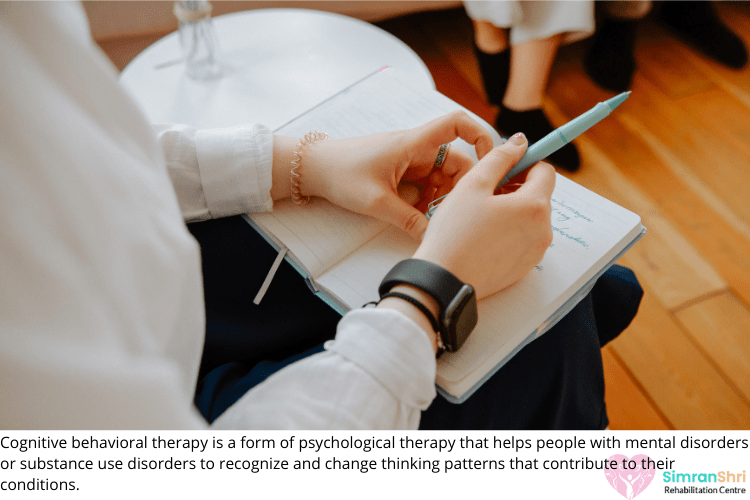

Cognitive behavioural therapy is a type of talk therapy that works better than medicines to treat mental health disorders. It is highly effective in treating mild to moderate severity of mental health disorders. It is best to combine cognitive behaviour therapy with medications such as antidepressants, anti-anxiety, or other medicines for highly severe conditions.
A counsellor helps individuals recognise their false or negative thoughts and replace them with positive and realistic ones. For example, if an individual feels that their life is worthless, it'll only get worse for them. Then cognitive behaviour therapy will make you aware of these thoughts and then help you swap these with positive ones. The change in one's thought pattern changes one's behaviour; this helps ease mental health conditions.

One can get cognitive behaviour therapy from a licensed counsellor or clinical social worker, psychologist, or other mental health trained professionals. Cognitive behavioural therapy for depression and anxiety are carried out in individual or group sessions or with self-help resources under the guidance of a therapist.
The therapist works hand in hand with the treatment seeker to set goals; for example, counselling sessions at the best de-addiction centre in India will set the goal for cutting back on alcohol or drug intake. The focus in these sessions is on how one feels and thinks and how it can be changed rather than dwelling on the past or personality traits. The treatment generally lasts for ten to twenty sessions. Some individuals require a few sessions, while others need them for more than a year. The therapist may give individuals a few tasks to complete by themselves.
Cognitive behavioural therapy for OCD helps individuals intellectualise their condition, i.e., one begins to understand that their brain is sending wrong messages to the body. The counsellor equips the client to identify these error messages and respond to them in a way that controls their obsessions and compulsions. OCD therapy techniques pay attention to the meaning an individual attaches with misinterpreted experience. For example, if your partner passes by you without acknowledging you, one might misinterpret their actions by assuming they are angry with you or want to ignore you. Your disorder might convince you to believe that this holds and is important. Cognitive behavioural therapy will help you look at this situation differently- that your partner couldn't acknowledge you because they were caught up with something or didn't see you.
Cognitive behaviour therapy for OCD focuses on unpleasant thoughts and their experiences. While some individuals can easily dispose of these thoughts, others face trouble shunning these thoughts from their minds. Which results in these people behaving differently or holding on to false beliefs such as "I'm a bad person for thinking this way".
Before the treatment ends, the therapists will teach some OCD therapy techniques to keep your condition at bay. If one feels that their condition has returned, they should pick up therapy again. One can return to treatment anytime they feel overwhelmed or need to get through a challenging time.
One should only work with trained psychotherapists. The job titles of psychotherapists differ depending on their role and education. But most hold a master’s or doctoral degree with training in psychological counselling. For example, psychiatrists are doctors that prescribe medicines and offer psychotherapy.
If you are looking for the best counselling for depression, anxiety or any mental health condition, you should wisely pick a therapist. Check the therapists:
● Licence or certification
● Area of expertise, and if it includes what you're looking for. Some therapists specialise in the best anxiety disorder treatment, Post-traumatic stress disorder, and other conditions.
For cognitive behavioural therapy to succeed, the treatment seeker must trust their therapist. If an individual is not comfortable or does not witness any improvement, they must switch their therapist.
Tags: cognitive behavioural therapy, cognitive behavioural therapy for anxiety, cognitive behavioural therapy for depression, cognitive behavioural therapy for OCD, OCD therapy techniques